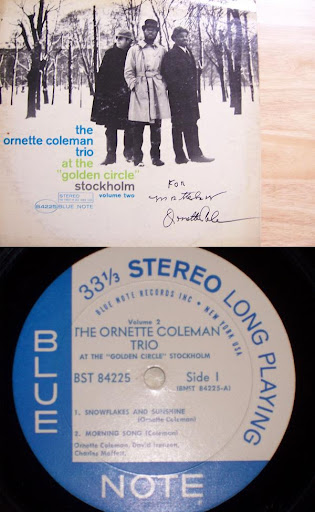
Coleman produces some great sets with his brief columbia sessions. Science Fiction, has more of a space-y and electronic aesthetic, where as Broken Shadows is more reminiscent of the Atlantic recordings but perhaps a bit more aggressive.
Besides the aggressiveness, you get all the boogie and swinging and positivity you’d expect. Tracks like “School Work” leave dancing melodies in your head (he has used this melody numerous of times in other compositions). Don Cherry plays at such a great level on these recordings and complements Ornette so well as he always does. Also accompanied is Bobby Bradford which makes an interesting variation to Cherry, and we also hear a strong tone difference of Dewey Redman against Coleman. Higgins and Blackwell are shown playing together making heavy rhythms and flooding sheets of percussion.
The last two tracks have Webster Armstrong joining the group singing some blues. The exciting juxtaposition of the harmolodics and vocals is like a wonderful roller-coaster filled with expression, feeling, and soul.
1972 - Columbia.
Ornette Coleman - Alto Sax; Don Cherry - Pocket Trumpet; Dewey Redman - Tenor Sax; Bobby Bradford - Trumpet,Charlie Haden - Bass, Billy Higgins - Drums, Ed Blackwell - Drums; Jim Hall - Guitar, Cedar Walton - Piano,Webster Armstrong - Vocals.
In spirit of Ornette, I’d like to talk about the PDX Jazz Festival. Not only did I get to see him perform, I saw a conversation with him and his son Denardo hosted by Howard Mandel (author Miles, Ornette, and Cecil: Jazz Beyond Jazz); at which I was able to shake Ornette’s hand and have him sign my Blue Note LP. “Only Thinking about improving the idea,” was the very first comment by him. And he continued to express his thoughts about sound, life, knowledge, sex... Everything! Always remaining in the most positive attitude and keeping a smile on his face.
Now from my understanding, all of the educational programs hosted by the festival were recorded and will eventually be available through KMHD. This one is worth checking out.
Later that night (to top off one of the best days in my life), I went and saw Coleman at the Schnitzer. Man, it was unbelievable. It was so transcendental and sublime, I spent most of the show with my eyes closed tapping my feet. Throughout the performance, melodies from classic compositions were mixed in. Like, “School Work”, “Beauty Is a Rare Thing”, “Lonely Woman”, “Turnabout”, and “Morning Song”. I feel privileged seeing how it has been 25 years since the last time Coleman played in Portland and perhaps one of the last.









